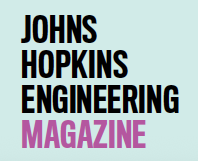Brandon Duderstadt, Engr ’18,’19 (MSE), is not afraid of change—he runs toward it, eager to find opportunities to disrupt existing technologies and explore new frontiers. That attitude led him to co-found Nomic AI, which has produced several of the world’s most popular AI products.

“The founding insight of Nomic was that there really needs to be a system that’s highly interactive and highly visual that’s tailored toward the kind of data sets that go into and come out of AI models,” he says. “Today, it’s petabytes of unstructured text, images, video, and audio with additional metadata sitting on top of it. So it just felt like a totally different problem that required a totally different kind of paradigm.”
Founded in 2021 by Duderstadt and Andriy Mulyar, who interned for Duderstadt at startup Rad AI, Nomic AI is valued at $100 million and was kickstarted by $2 million in venture capital funding in 2022.
The company’s products include GPT4All, an open- source tool that enables language models to run on a personal computer or smartphone and became the third-fastest-growing repository ever on GitHub, a cloud-based platform for code collaboration.
(By comparison, Twitter’s algorithm was No. 2.) In addition, there’s Nomic Embed, a suite of open- source models that enable AI personalization through a technology called retrieval augmented generation; and Atlas, the unstructured data engine that powers all of Nomic’s models.
A self-described “researcher at heart,” Duderstadt says he had a number of foundational experiences that put him on the AI path at Johns Hopkins, where he earned a bachelor’s in applied mathematics and statistics and a master’s in biomedical engineering. He initially thought he’d work with intelligent prosthetics or computer- integrated surgery, but a class in machine learning opened his eyes to the possibilities in that field.
Changing majors led him to impactful professors such as Carey Priebe, director of the Mathematical Institute for Data Science; Avanti Athreya, associate research professor; and Joshua Vogelstein, associate professor of biomedical engineering. In Vogelstein’s neuro data design class, Duderstadt says students had to create a “baby startup” and he learned how to develop applications and translate research to development.
Duderstadt still publishes research in conjunction with Priebe’s lab and aims to produce an associated research paper anytime Nomic publishes a new model. It fits with his mission of keeping AI available and approachable.
“A lot of the Nomic ethos is building AI in a way that is open, accessible, and explainable to everybody, and a big part of that is communication of results,” he says. “Beyond that, we try to push the envelope in research fields that we think are important.”
— MARC SHAPIRO
illustration by Joe Kimmel

